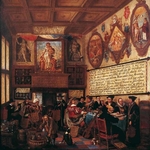‘De scharpheit van een gladde tong’. Literaire teksten en publieke opinievorming in de vroegmoderne Nederlanden
DOI:
https://doi.org/10.18352/bmgn-lchr.7066Keywords:
History of Literature, Public OpnionAbstract
‘The Sharpness of a Smooth Tongue’. Literary Texts and the Formation of Public Opinion in the Early Modern Netherlands
The Low Countries hardly play any role in international debates about the history of the formation of public opinion in early modern Europe. In the wake of Jürgen Habermas, historians have focused in particular on late seventeenthand eighteenth-century England and France. Scholars have criticised the notion that it was during the eighteenth century that the formation of free public opinion came into existence due to a combination of the periodical press, its critical role and a national readership. Nevertheless, the period before 1700 is hardly referred to at all during discussions about the role of public opinion. During that time a permanent, structured public openness did not exist. However, in the early modern Low Countries many socio-cultural and institutional conditions seem to be present which made the formation of critical public opinion among the population possible. The literary culture of these regions offers an important research subject for studies into the formation of public opinion.
Downloads

Downloads
Published
Issue
Section
License
Authors who publish with this journal agree to the following terms:
a) Authors retain copyright and grant the journal right of first publication with the work simultaneously licensed under a Creative Commons Attribution 4.0 International (CC BY 4.0) that allows others to share the work with an acknowledgement of the work's authorship and initial publication in this journal.
b) Authors are able to enter into separate, additional contractual arrangements for the non-exclusive distribution of the journal's published version of the work (e.g., post it to an institutional repository or publish it in a book), with an acknowledgement of its initial publication in this journal.
c) Authors are permitted to post their work online (e.g., in institutional repositories or on their website) prior to and during the submission process.
Authors are explicitly encouraged to deposit their published article in their institutional repository.








